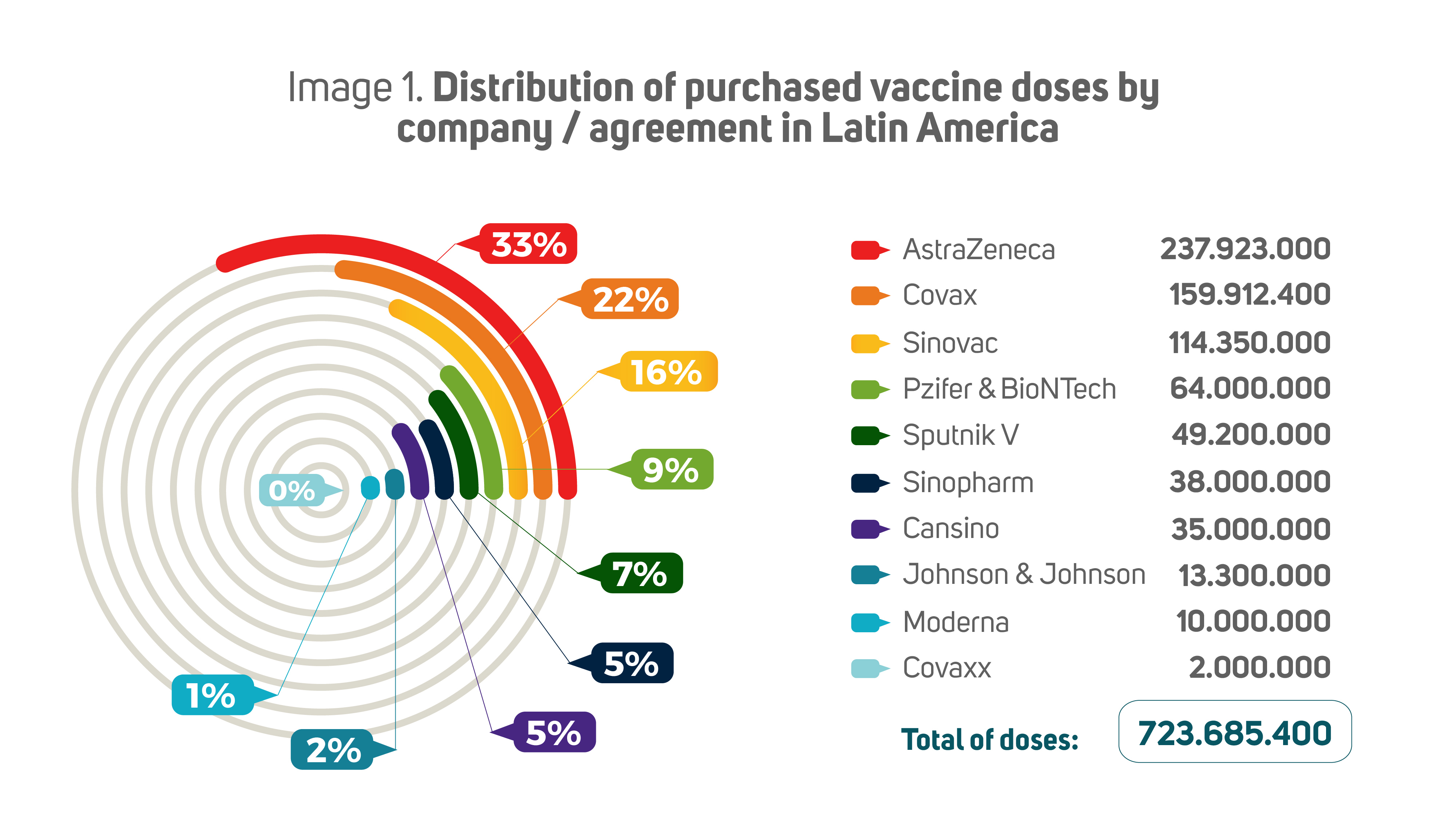In November 2020, society enthusiastically received from a number of pharmaceutical companies such as Pfizer and Moderna the news that they had found a 90% or more efficacy in their COVID-19 vaccines. This meant that governments could finalise purchase agreements for their doses, approving their emergency use and finally designing the logistical plans to face the challenge of distributing millions of vaccinations.
For Latin America, infrastructure is an important factor to consider when transporting vaccines, as it has regions that are difficult to access such as the Amazon jungle, mountainous regions or areas that cannot be accessed by road, only by air or water.
Taking as a reference 11 countries in the region: Brazil, Mexico, Argentina, Chile, Colombia, Peru, Ecuador, Panama, Bolivia, Uruguay and Costa Rica; approximately 720 million doses (image 1) of the different available vaccines have been purchased and some agreements are yet to be finalised.

Source: ALSUM
Approximately 90% of the doses acquired to date require a controlled temperature between 2°C and 8°C for transportation. Although these requirements are standard for any type of vaccine and the experience and infrastructure are already available there are still some challenges:
1) to keep the temperature controlled since any variation can impact on effectiveness,
2) to have the necessary logistical equipment to guarantee the transportation of the doses in the established times,
3) to have adequate assurances and,
4) establish protocols that provide cargo security.
On the other hand, 10% of vaccines present a greater logistical challenge since they are required to be stored at temperatures of -70°C for the Pfizer vaccines and -20°C for Moderna. This involves the acquisition of deep-freezing equipment for the storage, transportation and distribution of the millions of doses purchased. In addition, insurance companies must establish the risks faced by the logistics chain with this type of high-value cargo as it is vulnerable to temperature changes, mishandling or theft, and requires the necessary insurance. Below are some of the logistical challenges being faced by some of bigger countries in the region (that represent 68% of its total population):
Brazil
In Brazil, all CoronaVac vaccines will be stored in the Distribution and Logistics Center (CDL) of the Ministry of Health, which is in Guarulhos, in the metropolitan region of São Paulo.
For transportation to the South, Southeast and Midwest regions, vaccines will be delivered only in refrigerated trucks and vans that will be checked before departure. In the North and Northeastern regions, transportation will be by air and, upon arrival at the destination, air-conditioned vehicles will transport them. Some places will even have boats with special chambers to support transportation.
Following the arrival at each location, the storage of the vaccines and the onward logistics are the responsibility of the local councils. There are 150 vehicles in the current fleet throughout Brazil, including trucks and vans, and all have a satellite tracking and blocking system. In addition, another way to maintain transport security will be through armed escorts carried out by the Military Police throughout the country during the trip.
México
The Mexican government plans to roll out vaccines that require deep freezing in urban areas, and for rural regions vaccines that only require freezing and/or refrigeration.
The UNAM (National Autonomous University of Mexico) made 20 ultra-freezers available to the federal and Mexico City governments to contribute to the cold chain, essential to support the vaccination process against COVID-19. Together, they have a capacity of 10,500 litres, which would allow the storage of three million to four million doses of the vaccine from the pharmaceutical company Pfizer.
Mexico has around 300 freezers throughout the country for the preservation of the vaccine. Most of these teams belong to the state, but others were provided by various higher education institutions.
Argentina
The doses will arrive by air and then Correo Argentino (the local Post) will take care of the distribution by land in all the provinces except Santa Cruz and Tierra del Fuego. In those two provinces the vaccines will arrive by Aerolineas Argentinas planes, and once they are there, Correo Argentino will distribute the vaccine locally.
Colombia
To guarantee the cold chain it is planned to acquire 44 freezers, nine of which are already in the national territory. Additionally, a warehouse in the Bogota free zone will be established as a distribution centre that has the capacity to store 50 million vaccines since each freezer can hold more than 1,300,000 doses.